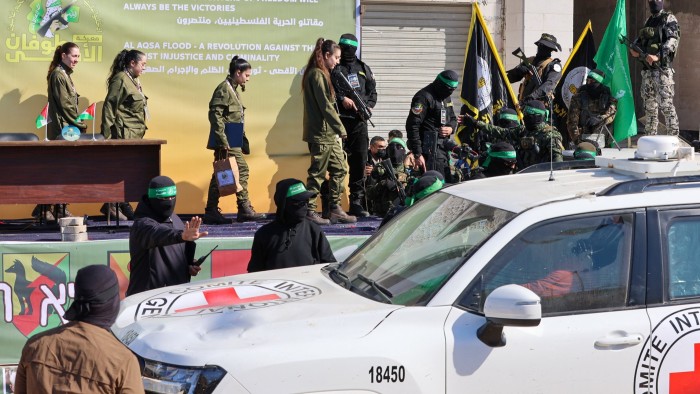Unlock the Editor’s Digest for free
Roula Khalaf, Editor of the FT, selects her favourite stories in this weekly newsletter.
Four female Israeli soldiers held captive by Hamas were with Israeli forces after being handed over to Red Cross personnel on Saturday as the ceasefire deal in the Gaza Strip entered its second week.
Some 200 Palestinian prisoners held in Israeli jails were also set to be released later in the day, according to the terms of the agreement that halted more than 15 months of war. The truce went into effect last Sunday with the release of three Israeli female civilian hostages and 90 Palestinian detainees.
The four soldiers making their way back to Israel — Liri Albag, 19, Daniella Gilboa, 20, Karina Ariev, 20, and Naama Levy, 20 — were seized from a military outpost on the Israel-Gaza border during Hamas’s October 7, 2023 attack that triggered the conflict. Images and video of their bloody abduction were broadcast last year. Their freedom has become a central demand of the hostage release movement that coalesced around the families of those still held captive in Gaza.
The handover by masked Hamas gunmen to the Red Cross took place in Gaza City’s Palestine Square, amid a rally of hundreds of uniformed and armed militants and cheering onlookers.
The four Israeli women were marched across the square and on to a small stage bearing a banner, in Hebrew, that read “Zionism will not win”. After briefly waving to the crowd they were ushered into Red Cross vehicles.
The Red Cross then drove the four to a transfer point where they were handed over to Israeli special forces and intelligence agents.
The show of force by Hamas extended across the Gaza Strip, with convoys of white pick-up trucks filled with gunmen and flying the green Hamas flag broadcast on Arab television stations and social media.
This second instalment of the hostage-prisoner release was momentarily thrown into doubt on Friday night after Hamas announced that four soldiers would be released.
Israeli officials claimed that this was a violation of the agreement’s terms that calls for civilian women still alive — of which there is believed to be one remaining in captivity — to be released ahead of soldiers. The Israeli government nevertheless decided to move ahead, and it remains unclear whether the civilian, Arbel Yehud, will be released as part of next week’s exchange.
US-led mediators secured a six-week ceasefire deal between Israel and Hamas this month, the first stage of a complex three-stage agreement that could permanently end the war and secure the release of the remaining 90 hostages held by Hamas.
Donald Trump had warned that there would be “all hell to pay” if an agreement had not been reached before his inauguration on Monday. On Friday, the new US president said: “The deal should hold, but if it doesn’t there will be a lot of problems.”
Under the terms of the agreement, the first stage consists of the release of 33 Israeli hostages — including children, women, the sick and elderly — in exchange for about 1,900 Palestinian prisoners, hundreds of which are serving lengthy sentences on terrorism and murder charges. The releases are due to take place in weekly instalments over the 42 days of the first stage.
During this time, Israeli troops will withdraw from populated areas in the shattered territory and displaced Palestinians will be allowed to return to their homes in northern Gaza beginning later on Saturday. Humanitarian aid entering the strip has already increased sharply over the past week.
By day 16 of the first phase, Israel and Hamas are due to start negotiating details of the second phase, during which the remaining living hostages will be freed in exchange for more Palestinian prisoners, a further withdrawal of Israeli forces from Gaza, and a full end to the war. The final phase will involve the return of bodies of deceased hostages and the beginning of Gaza’s reconstruction.
Read the full article here




